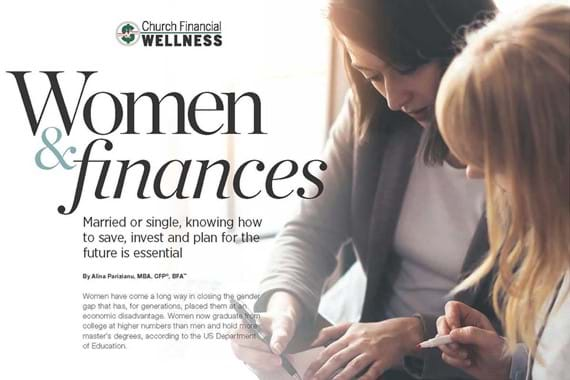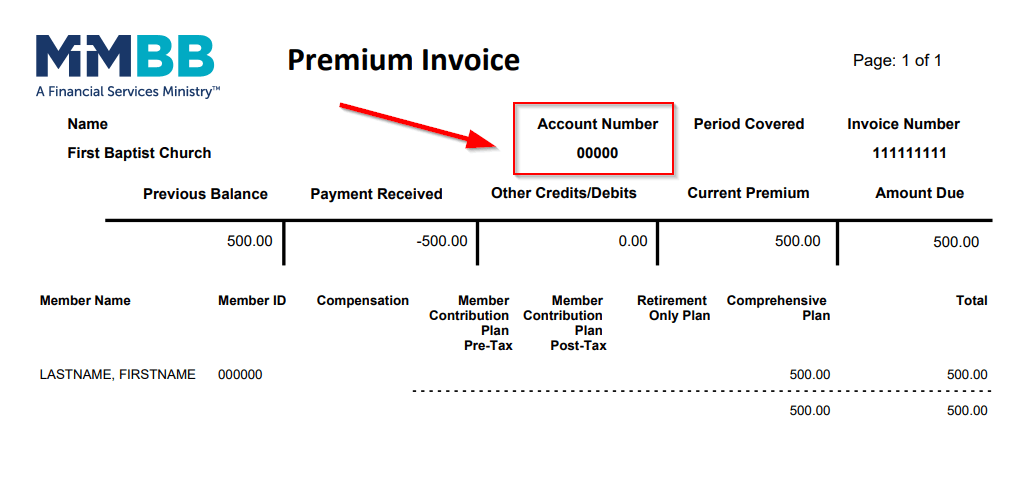Featured Article
While many retired clergy choose to enjoy their well-deserved season of rest, some seek ways to continue nurturing their spiritual calling.


Yet, women continue to face financial challenges.
For one thing, women still earn less than men. According to the U.S. Bureau of Labor Statistics, women who work full-time earn about 82% of what men earn, on average.
While the pay gap between men and women has narrowed considerably when they have similar degrees and jobs, women’s income is greatly affected by the choices they make about which jobs to hold and how to care for their children and/or elderly parents.
For ordained female clergy, the gender pay gap has closed significantly; however, it is offset by the challenges of the stained glass ceiling for women, who are more likely to be employed as part-time clergy or in lower-paid or non-paid positions. A similar situation can be found for females working in faith-based organizations, where they are more likely to serve in lower-level positions rather than heading an agency.
There are several significant financial challenges for women who choose to take time away from the workforce to raise a family. Career breaks result in lost income and employer benefits, such as retirement benefits and health insurance. Another result is a potentially lower Social Security retirement benefit, because this is based upon the number of years spent in the workforce and how much was earned. It also can be difficult for a woman to find a new job or a comparable position when deciding to return to the workforce.
Meanwhile, women who choose to stay in the workforce are more likely to request flexible schedules to compensate for their family responsibilities — both of which can still impact their salaries and long-term career growth. According to Christianity Today, pastors who are mothers are more likely to be paid less by congregations.
This occurs for numerous reasons; in particular, their part-time status and need to balance family responsibilities, as well as the challenges of educational and administrative requirements which can keep women from advancing as quickly as their male counterparts. The fact that they are part of a dual-income household might also affect female clergy salaries.
Statistics show that most women will be the sole financial decision-maker in their household at some point in their lives as a result of divorce or death. Today, about 50% of all marriages will end in divorce. And statistically speaking — with all other things being equal — women are likely to live longer than men.
Therefore, women need to learn about money and investing sooner rather than later. While many women learn about household money matters at a young age (how to balance a checking account, save with coupons and online discounts and pay the monthly bills), why not get educated about more complex financial matters, such as investing and saving for retirement?
Women tend to lack confidence in this area because of past societal gender roles in which women took a less active role in financial decision-making. Today, more women than ever are responsible for their own and their families’ financial well-being. It’s imperative that they understand how to save, invest and plan for their futures.
Women can learn how to take control of important financial matters by implementing the following strategies:
A financial plan
A financial plan helps a person plan for life’s goals — paying down debt, buying a house, or saving for retirement. Most women want to set up a financial plan but don’t know where to begin. So, let’s start with the definition of a financial plan.
According to Investopedia.com, a financial plan is “a comprehensive statement of an individual’s long-term objectives for security and well-being and a detailed savings and investment strategy for achieving those objectives.” A financial plan can be created independently or with the help of a certified financial planner.
While there is no set template for a financial plan, the main elements generally include a retirement strategy, a risk management plan, a long-term investment plan, a tax strategy, and an estate plan. A certified financial planner can help create a plan that meets a client’s needs and expectations. A financial plan is not “set in stone” — it should be reviewed and revised as necessary to help ensure a smooth transition through various life stages.
Retirement savings
Retirement savings are essential to one’s future and can help provide peace of mind. Conventional wisdom once said that if a person saved 10% of their income throughout their working years, they would have adequate assets to retire. Unfortunately, this is no longer the case, given rising medical costs and other expenses in retirement.
Even if someone begins saving early, a 10% savings plan is not likely to yield enough for them to maintain their current lifestyle in retirement. A better approach is to achieve a 10% savings rate before the end of one’s 20s, a 12% rate during one’s 30s, and a 15% savings rate from age 40 to retirement. The good news i s that any contributions an employer makes toward this goal can be included. If someone is lucky enough to have an employer that matches personal contributions in a 403(b) retirement account, that’s a can’t-miss opportunity — essentially, it’s free money.
If a 10% savings rate is unobtainable at first, we suggest trying to save at least enough to receive the full employer match at work.
An emergency fund
In everyday life, things happen. The car breaks down. The roof leaks. Medical expenses arise. Maybe there’s a job loss. These are just a few examples of why an emergency fund of three to six months of living expenses is important: it helps a person manage unexpected expenses without incurring additional debt.
An emergency fund is easy to start: just open a savings account and deposit a little each week or month until the goal is reached. To make it even easier, savings can be put on “autopilot” by setting up regular withdrawals from each paycheck to a separate, rainy day fund.
The most important thing that women can do is build confidence and get educated about their finances — and not to be intimidated. Women should take an active role in managing their finances. Whether married or single, they need to know how to save, invest and plan for their future.
Alina Parzianu is a Financial Planning Specialist at MMBB Financial Services [ www.mmbb.org ]. Prior to joining the MMBB staff, Parizianu spent 14 years in the financial services industry, including as vice president and credit portfolio manager for a major European investment bank in New York. She holds the CFP® certification, an MBA, and a behavioral financial advice certificate. (Footnotes were omitted.)
Back to Financial Resource CenterThank you for joining the MMBB mailing list. You will begin to receive information soon.
Translations of any materials into languages other than English are intended solely as a convenience to the non-English-reading public. We have attempted to provide an accurate translation of the original material in English, but due to the nuances in translating to a foreign language, slight differences may exist.
Las traducciones de cualquier material a idiomas que no sean el inglés son para la conveniencia de aquellos que no leen inglés. Hemos intentado proporcionar una traducción precisa del material original en inglés, pero debido a las diferencias de la traducción a un idioma extranjero, pueden existir ligeras diferencias.

MMBB Financial Services is pleased to unveil our new website experience.
Watch a guided tutorial of our enhanced site to introduce you to important new features designed to help you live your life with financial confidence.
You will be linking to another website not owned or operated by MMBB. MMBB is not responsible for the availability or content of this website and does not represent either the linked website or you, should you enter into a transaction. The inclusion of any hyperlink does not imply any endorsement, investigation, verification or monitoring by MMBB of any information in any hyperlinked site. We encourage you to review their privacy and security policies which may differ from MMBB.
If you “Proceed”, the link will open in a new window.


 Back to Top
Back to Top